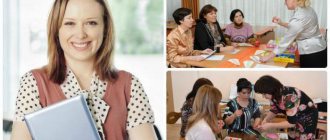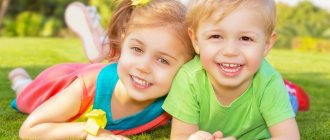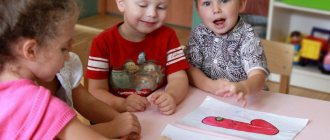How to help your child maintain mental and physical health?
It is important for parents to realize that a child’s mental health depends on many factors, notes clinical psychologist at the Children’s Research Institute of the Moscow Health Ministry, Ekaterina Kubli.
1. Daily routine.
Try to be a positive example for your child and encourage him to try to stick to his daily routine. Be patient, remember that a good habit is not developed overnight.
2. Proper nutrition.
Lack of nutrition or overeating contributes to metabolic disorders and, as a result, the risk of many diseases. A school-age child should eat at least 4 times. Try to reduce fast carbohydrates (sugars, baked goods, soda) as much as possible. Have “healthy” snacks: nuts, dried fruits, fresh vegetables and fruits, drink more clean, still, unboiled water. Remember that a growing body needs proteins, so include meat in your diet. 3. Healthy sleep.
The child should have his own sleeping place, comfortable clothes for sleeping, no extraneous noise, and a ventilated room. You should not watch scary movies, play consoles/tablets, or noisy games before going to bed. It is important for parents to remember not to scold their child before bedtime. To improve the quality of sleep, you can take a bath with pine extract, breathe in essential calming/relaxing oils, and use a weighted blanket. Sleep no later than 22 hours, duration of at least 9 hours. 4. Motor activity.
Find time for regular walks in the fresh air with outdoor games. Take active rest between classes (throwing a ball, doing pull-ups, hanging on a horizontal bar, doing push-ups from a wall or floor). We don’t use gadgets for relaxation!!! The child’s nervous system is far from perfect. It is difficult for children to control the processes of excitation and inhibition of the nervous system. To normalize the tone in the body, increase the energy component, relieve emotional stress, as well as general physical development, visit the pool regularly. Exercises to regulate muscle tone and relaxation exercises are especially useful for schoolchildren. To form a child’s emotional stability, it is important to teach him how to control his body. Active mental activity and accompanying emotional experiences create excessive excitement in the nervous system, which, accumulating, leads to tension in the muscles of the body. The ability to relax allows you to eliminate anxiety, excitement, stiffness, restore strength, and increase your energy supply. We will help maintain the health of our children if we teach them how to relieve excess tension. 5. Love and mutual understanding.
Mental health problems are much more likely to occur in children who suffer from a lack of interaction with adults, as well as in children who grow up in conditions of family discord. Always find time to talk with your child. Be interested in his problems, delve into and discuss the difficulties he encounters. Use the time on the way to kindergarten or school (talk about your thoughts, about your childhood). It is worth spending some time with your child “just like that,” and not for some purpose: watch a movie together, go out of town, go on a picnic, talk. The main thing here is the ability to simply be “together” with the child, and be completely present with your soul and thoughts.
HOW TO GO TO THE GARDEN AND NOT GET SICK
16.Aug.2021
The frequency of illnesses in a child in kindergarten depends on two factors: the activity of the infection and the resistance of the child’s body to it. Unfortunately, we have no influence on the infection. Well, perhaps, try not to allow the child into areas where there are obvious concentrations of possibly sick people. Therefore, all that remains is to strengthen your child’s immunity. Here you can move in two directions: strengthen resistance to diseases in general and develop specific immunity to specific infections.
Prevention measures
1. It is necessary that the baby has the opportunity to strengthen the body over the summer: breathe in plenty of fresh air, swim in the sea or river, run barefoot on sand, grass, pebbles and enjoy the summer sun. Whether it will be a vacation spent with your child, whether you will send him to his grandmother, or simply go out into nature with the whole family a couple of times a week - it’s up to you. In any case, it will be a worthy investment in your baby's health!
Don’t forget about seasonal fruits, vegetables and berries, which are so rich in invaluable vitamins and microelements!
2. The “greenhouse” child turns out to be unprepared for the viral attack that is inevitable in the garden. Therefore, it is worth accustoming your child to contact with other children in advance (including indoors), before the time when you plan to send him to kindergarten. In addition to the communication experience, it will also be a workout for his immune system!
3. From an early age, teach your child a proper, balanced diet. The daily menu should consist of different food groups rich in vitamins, minerals and trace elements. It's no secret that the most easily absorbed vitamins are found in vegetables, fruits and berries grown in the same area where you live. In addition to juices, compotes, tea, the baby must drink water every day!
4. Systematic hardening is a very effective remedy.
Hardening rules:
• hardening is only possible for a healthy child; • the baby should like the procedure, so we present everything in the form of a game and with the involvement of favorite “dolls”; • gradually reduce the temperature (every 3-4 days by 1-2°C); • if there is a break of 5-10 days, then return the temperature 2-3°C back; • if the break in hardening was more than 10 days, then we start all over again.
These types of hardening are suitable for children from 1 to 3 years old
:
• washing the face (and for children from 2 years old, I also wash the upper chest and arms to the elbow). We start at 20°C and reduce to 16-18°C; • then you can move on to general dousing with an initial water temperature of 34-35°C and reducing it to 24°C.
For preschool children, wash their face, neck, chest and arms above the elbow, and raise the water temperature to 14°C; during general dousing, the temperature is gradually reduced to 24°C. It is also recommended to pour over the feet with a gradual decrease in temperature from 36-37°C to 20°C.
A healthy body is less susceptible to diseases. Therefore, first of all, we sanitize all chronic foci of infection. Be sure to regularly see the dentist and treat problem teeth, if any. And we don’t hope that the situation will resolve itself, since “the dairy products will fall out anyway.” Unfortunately, caries, with all its rapid complications, also affects baby teeth. Naturally, we don’t forget about prevention, so we brush our teeth twice a day, choosing tasty and high-quality toothpaste!
Also important and necessary for increasing the body’s resistance to various infections are vitamin C, iodine, and vitamin D. It is not necessary to buy expensive vitamins for your child; it is enough to give him a rosehip decoction daily for a certain time (2-3 weeks), or buy the most ordinary "Ascorbic acid". A child needs vitamin D not only for full growth and development, increasing the body’s resistance to infections, but also in order to cope with mental and physical stress in the garden, actively play with peers and be in a great mood! That is why it is important that your child’s diet is rich in this vitamin, or you can give it additionally by purchasing, for example, an oil solution of vitamin D at the pharmacy!
The baby’s immune system can also be strengthened with the help of preparations from medicinal plants called adaptogens (Echinacea, Eleutherococcus). 2 – 4 weeks at the end of summer is enough for the course.
When the child comes home from the kindergarten or clinic, rinse the child with a ready-made preparation based on sea salts, sold in a pharmacy, for example, Aquamaris. Afterwards, you can lubricate your nose with oxolinic ointment.
Of all the above, the baby’s mental state also has a significant impact on the immune system. A child who goes to kindergarten with joy, and not with tears, is not so vulnerable to infections and viruses. Therefore, it is important for parents to do everything possible to ensure that kindergarten becomes a source of positive emotions for the child.
I wish parents and their children that this transition period will be easy and joyful!
Elena Krivonosova, pediatrician at the healthy child’s office of the Nyagan City Children’s Clinic


